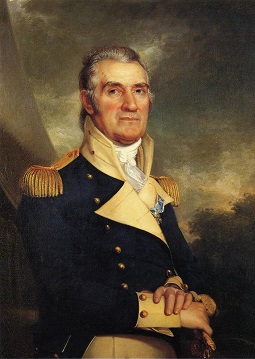Spy System 1777 
Page VIII
But Clark, a sick and exhausted man, was now near the end of his immediate services to Washington. He wrapped up his December 30 letter by noting that:
as the Armies are both gone into Winter quarters I presume nothing further will be wanting in my department-therefore beg your permission to visit Mrs Clark & prepare some necessaries for myself-which I am in great want of.

Having faithfully served as General Washington's master of spies, Major Clark made one final request of his employer: A letter of recommendation:
I will also be much obliged to you for a Letter to the President & Congress with such Character as you may think I deserve
On January 2, 1778 Washington fulfilled Clark's request, sending a glowing letter to Laurens outling the great service the spy had rendered his nation:
I take the liberty of introducing Major John Clark, the Bearer of this, to your notice. He entered the Service at the commencement of the War and has for some time past acted as Aid de Camp to Major Genl Greene. He is active, sensible and enterprising and has rendered me very great assistance since the army has been in Pennsylvania by procuring me constant and certain intelligence of the motions and intentions of the Enemy
These letters had their effect. On January 13 Clark, evidently recovering in health, wrote to Washignton from York, PA on January 13, 1778:
Your kind letter of recommendation, I had the honor to deliver to His Excellency the President, who laid it before congress in my absence. since which, they have appointed me an Auditor with Mr Clarkson to settle & adjust the accounts of the main Army-whether I am equal to the task assigned me, or not, I cannot presume to say; but shou'd I accept The appointment, I flatter myself under your good patronage I shall be able to acquit myself in the duties of my station with honor, my utmost exertions shall be tried to give general satisfaction & to discharge the trust reposed in me with integrity & impartiallity
Since the position of Auditor had no rank in the army, he requested permission to resign his commission as Major and Aide-de-Camp to Greene
I have wrote Major General Greene, informing him of it, & beg'd permission to resign my Commission as an Aid de Camp, I fully intended serving him in that capacity while it was convenient for the benefit of my Health, & consistent with my station in life, & at present 'tis inconsistent with either-therefore hope you will permit me to retire-& accept this as my resignation-And beg leave to assure you, that any time you may think I can render you a service, either in the civil or military line, I shall be happy to obey your commands.
He closed by reitering his gratitude for the letter that had landed him such a welcome professional appointment:
I sincerely thank you for all favors, but in A particular manner, for your Letter to the president; which with General Greenes without any solicitation on my part, have procured me what I did not expect
On January 24 Washington replied, urging Clark to immediately accept the postion of auditor, since the army accounts were in a such a state of diarray:
I hope you will determine without delay, whether you will accept the appointment of auditor, and if you do, that you will repair as soon as you possibly can to the Army to enter upon the duties of it. An office of this nature has been long thought expedient, and for want of it, I am persuaded the Public have suffered greatly as well as many individuals. There is a great number of accounts such as recruiting &c. now to be taken up and adjusted.

General Samuel Smith
Rembrandt Peale, circa 1817
Later, Clark returned to active service, being commissioned captain in the 13th Pennsylvania Regiment, transferring to the 8th Pennsylvania on July 1, 1778, to the 1st Pennsylvania in 1781, and to the 3rd Pennsylvania in 1783. He retired June 3, 1783 because of the recurrence of ill health, resuming his law practice in York until his death in 1819.
Clark would emerge once more to serve his nation in time of war: In 1814 he volunteered as an aide to Major General Samuel Smith for the defense of Baltimore when the British invaded Maryland during the War of 1812, retiring from service once again when the British receded from Chesapeake Bay. There was patriotic fire in John Clark's veins that even aging could not quench.
Adapted from "Spy System 1777" by John F. Reed, from The Picket Post, Valley Forge Historical Society, Winter 1976



